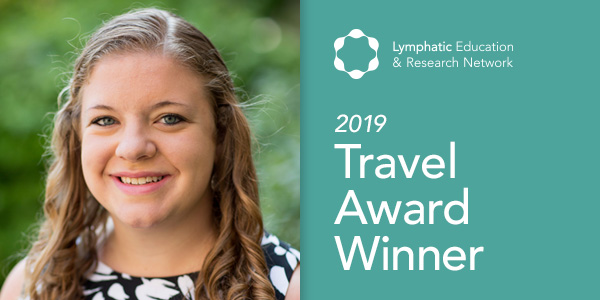Laura Alderfer, currently a Ph.D. student at the University of Notre Dame (Notre Dame, IN), under the supervision of Dr. Donny Hanjaya-Putra received a travel award from LE&RN to attend the Lymphatic Forum in Austin, TX. We asked Laura to share her thoughts on that experience with us and to tell us a bit about her research and future plans.
What did you get out of the Lymphatic Forum? Why did you feel it was important to attend?
The Lymphatic Forum was especially impactful as I was in the early stage of my PhD research and within three days of presentations and posters, I was able to learn about the most recent advances, both within my niche and within adjacent niches. The forum provided a unique gathering where everyone was working on some aspect of lymphatic research and allowed for thought-provoking, detail-specific discussions which usually cannot occur at more broad-topic conferences. As I listened to presentations from labs around the world, I was constantly writing down new topics to learn more about or new experiment ideas that were facilitated by a concept or result that was presented.
What are your areas of interest in research?
My dissertation research focuses on designing biomaterials to control cellular behavior for regenerative medicine applications. By designing a synthetic extracellular matrix (ECM) to mimic the native environment of the body, I aim to create functional lymphatic vessels, ex vivo, that can then be transplanted into a patient as the first available long-term treatment for lymphedema. Investigating how the mechanical and biochemical cues within the microenvironment impact lymphatic tube formation provide insight for how to design and pattern the biomaterial scaffold to control lymphatic vessel formation.
What are your hopes and plans for your career and your research?
I’m particularly interested in translational medicine and getting technologies from the lab to the patient. Transitioning from animal models to human clinical trials is inherently problematic, but organoid models and microfluidic models can help better predict clinical trial results. Additionally, there are challenges in scaling up the production of a therapeutic that have to be addressed in order to meet the need and be cost-effective. I believe that a therapeutic is only impactful once it can be accessed by the majority of the patients who need it. I have a keen interest in global health and I aspire to work on designing therapeutic solutions that can be utilized by both developed and developing countries.
Why do you believe that, in general, lymphatic research is important? What might the field accomplish within the next few years?
The lymphatic system remains poorly understood in comparison to other physiological systems, despite lymphatic vessels pervading the entire human body. Many disease states involve the lymphatic system, from lymphedema to wound healing, cardiac repair, cancer metastasis, and neurodegenerative conditions. If we are to design new therapeutics for this vast array of conditions, we must first have a greater understanding of the lymphatic system. The field of vascular biology has seen great advances in recent years, and I hope that lymphatic research can adapt some of these advances in the near future to further our understanding of the system and design therapeutics for this under-addressed area of medicine.
LE&RN programs, like LE&RN Travel Awards, are only possible because of our Partners and Supporting Members. Become a Supporting Member today.

